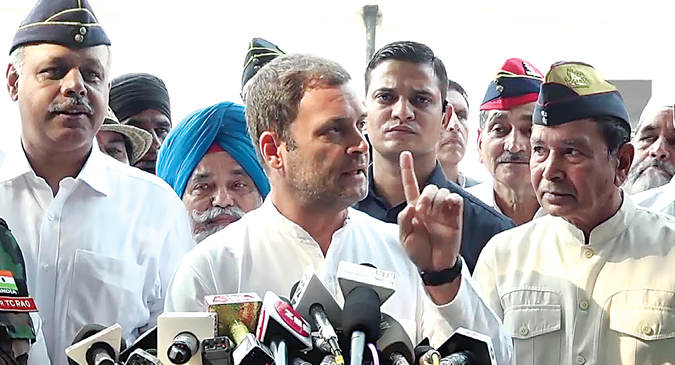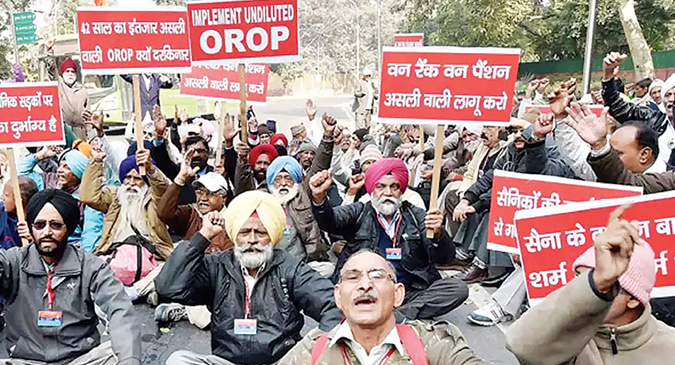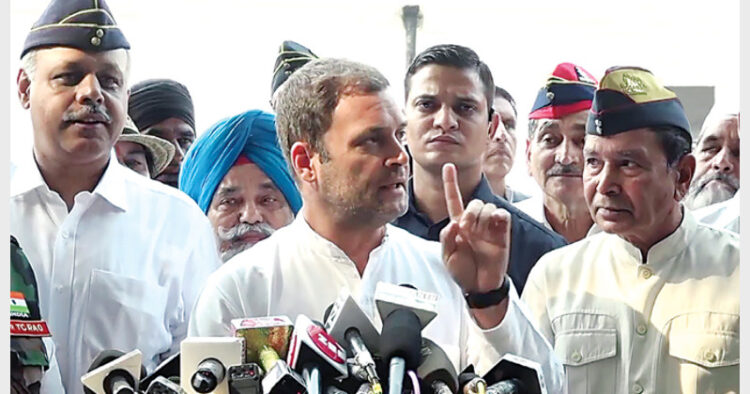Veterans who have joined the bandwagons of political parties and are pouring vicious diatribe must realise that such actions do not augur well to their stature. Their involvement in political controversies would automatically lower the image and prestige of the armed forces as truly apolitical—the last bastion of mutilated or messy democracy
“Old soldiers never die; Never die, never die; Old soldiers never die; They simply fade away” was the soldier’s folklore song of a bygone era. ‘Apolitical’ nature of Armed forces flows out of the British soldier’s folklore song. At the same time, Clausewitz most famous aphorism is “War is the continuation of politics by other means.” Naturally, it represents the contrarian view of inextricable inter wining of politics and armed forces for eternity.

A group of Ex Servicemen with Congress president Rahul Gandhi in New Delhi
Veterans are not a monolithic group. Many fault lines divide them. Majority of Armed Forces veterans merely fade away as ordinary citizens in society. Some among them air their views in writings about national security issues, particularly about the state of modernisation of Armed forces, their status, pay, perks and other welfare issues. There are few others who vociferously champion the cause of armed forces on the visual media. Also, there are others who participate in debates as panellists on partisan political lines on visual media channels. Of course, those residing in Delhi and its neighbouring areas comprising of various groups also participate in protests at Jantar Mantar in Delhi.
Having “toed the line of political masters of the day while in uniform like caged parrots”, quite a few among them roar as “tigers” in front of the visual media or during “Jantar Mantar” protest rallies merely for the sake of photo opportunities—more sound and fury; less substance.
Ask such veterans as to how many among them “voiced their concerns” whilst in uniform and resigned from service in protest for non-acceptance of their professional views. By exception only, one may find someone raising their hands.

Ex Servicemen staging a protest at Jantar Mantar, New Delhi
What is the difference between political party leadership groups going to the President to present their contrarian views with the latest armed forces veteran’s initiative of writing a letter to the President, that includes tainted seniors like Gen Kapoor of Adarsh Housing Society scam, as one of the signatories?
Viewed in such a wide variety of veterans with divergent views, the claims of miniscule veterans group to the President to refrain politicians from “politicisation of armed forces” represents one view, but not necessarily the majority view.
if Armed forces professionals want to be genuinely apolitical, they can use individual channels to convey their views to the President instead of voicing concerns as a groupIpso facto, the “Old folklore Song” theme “They simply fade away” is no longer followed by the veterans of the armed forces due to divergent views and partisan leanings. Nonetheless, if Armed forces professionals want to be genuinely apolitical, they can use individual channels to convey their views to the President instead of voicing their concerns as a high-level group and more importantly circulating the letter in the media even before the Presidents Secretariat acknowledged its receipt. By doing so as a group, they have “willy nilly” stirred up a ‘political’ controversy going against the “apolitical nature’ of armed forces.
Undoubtedly, such moves of writing letters to the President on sensitive political issues amid a highly no-holds-barred electoral battle has only produced more noise than any worthwhile end result. By doing so, they have only further denigrated and compromised the stature of present serving Chiefs: “Spineless Wonders” for their command down the line.
Let me briefly review in outline the politicisation of Indian Armed Forces over the past 70 years. Perforce, the need is for a nuanced view devoid of partisan affiliations for the wider civilian audience.
The politicisation of Armed forces is not a recent phenomenon but dates back to post August 1947 days. Politicisation started with supersession’s at the Chief’s level during Nehru’s regime to include: Gen K S Thimayya superseding Gen Sant Singh and Kulwant Singh; and most disturbing elevation of Lt Gen BM Kaul, Army Service Corps Officer of Kashmiri lineage, to command the Corps in Tawan-Tsela Sectors during late 1959-1962 period that ended in the Himalayan Debacle 1962.
Furthermore, politicisation of Armed forces continued during the Indira Gandhi regime to include: Gen TP Riana superseding Gen P S Bhagat, the first Indian officer to win a Victoria Cross by giving a short extension to Gen Bewoor; and, Gen A S Vaidya superseding Gen S K Sinha (for his opposition to Operation Blue Star) and Gen NC Rawlley.
Next, recent examples of supersession’s are recounted to include: Gen Bipin Rawat superseded 2 Gens: Praveen Bakshi & PM Hariz—Dec 2016; and Gen Suhag’s elevation before the election results in 2014. In the Navy, Admiral Robin Dhowan superseded Vice Admiral Shekhar Sinha recently. In 2000, the Naval chief, Admiral Vishnu Bhagwat, was dismissed for defying the Government’s appointment of a three-star Admiral over his choice.
Less known was the politicisation of the armed forces during the Bansi Lal and Mulayam Singh Yadav as Defence Ministers, which was grudgingly accepted as the norm that consolidated the trend.
No need also to flog the Seniority vs. professional operational criteria endlessly. In a democracy, the choice of selection of Chiefs is the exclusive right of the political leadership of the day. The decision must favour demonstrated operational performance over seniority, which is determined by numbers at the time of graduating as commissioned officers based on the order of merit as a cadet.
Let me highlight that the responsibility for the creeping politicisation in the armed forces lies squarely at the doorsteps of the three services what with “Old Boys Net–Beret and Belt-caste and creed” deciding promotions. Naturally, those left out of promotions despite operational merit and awards take recourse to political and bureaucratic interventions. Ultimately they constitute the bulk of the “disgruntled veterans lot”. Also, those who fail to get plum appointments as post retirements rehabilitation in top jobs constitute the ‘sulking lot’ instead of gracefully fading away.
In retrospect, all the three Service Chiefs since 1947 cannot be, therefore, absolved of their share of responsibility for the current state of politicisation, particularly of Veterans due to parochial affiliations and considerations. General’s hobnobbing with the political leadership of the day or political leaders placing their favourites in the position of power is quite natural and healthy.
In the past, no one asked—and no reason was given—for extension or supersession at all levels. Today, there are three levels of redressal of grievances—internal at the Chief’s level, Armed Forces Tribunal and the Courts. Most critical it is to accept that armed forces are the “Coercive Apparatus” of the State. In the context of Hybrid Warfare today, antiquated-cum-classical thinking of “maintaining apolitical stance” relevant to “Conventional Hot War scenarios” does not and cannot hold good. Accept and admit all alike that when employed in counterinsurgency and even counter-terrorism roles, the politicisation of Armed forces is but natural.
Following Police Action in September 1948 in Hyderabad, the Army was employed to quell the armed Dallams of the Communist movement—political and military environment. Followed the unending involvement since 1955 in counterinsurgency role starting with Naga Insurgency: socio-politico-economic-military extraordinarily complex and dynamic environment. Today, armed forces are overstretched in almost all “Hot Crisis” situations, particularly in hybrid warfare in J & K.
Deeply engaged in such politico-military environments, the politicisation of armed forces personnel has taken place at all levels. After all, the senior hierarchy has repeatedly been bending to the whims and fancies of the political leadership of the day: IPKF intervention in Sri Lanka which ab initio was doomed to fail, since it was against military professional wisdom after USA-Vietnam debacle—“Big Armies and Big Money” cannot quell insurgency in alien lands.
Add to it another significant issue, that is, the day armed forces accepted to function under “Unified Commands” by local Chief Ministers, they surrendered to political leadership diktats and consequent politicisation.
Why did the senior hierarchy surrender their status by accepting condescending subordinate roles that ultimately resulted in lowering their status below their civilian counterparts? The answer is simple. Go back to the Clausewitz’s aphorism “War is the continuation of politics by other means.” Its consequence or fallout is politicisation, which is unavoidable.
Furthermore, how many veterans can lay claims to “thumping the table” during the Army commander’s conferences and fearlessly projecting their views on national security issues and armed forces personnel affairs? How many can also claim that they tendered resignations against the cumulative build-up of politicisation of Armed forces on partisan political lines?
If today, the Armed forces’ modernisation has been shelved into the background since Bofors Scam breakout, all those Veterans, particularly those in the highest ranks, are squarely responsible by remaining mute on such vital issues whilst in Uniform.
Also, had the Veterans jointly represented to the President and going public on the political hierarchy’s absolute neglect of procuring state-of-the-art weapons and equipment, one would have credited them with yeoman service to their serving brothers-in-arms.
Not, but not the least is the issue of “free hand to armed forces” operating in Line of Control in eyeball to eyeball confrontation on the borders or in counterinsurgency / terrorism scenarios. Recently, Lt Gen Hooda, former Northern Army Commander and present Advisor to the Congress Party on National Security Affairs, is on record highlighting that “he had full freedom to employ his forces”. If it is true, why did he not allow his Rashtriya Rifles units to respond with full freedom against the terrorist-inspired stone pelters? Talk to any tactical level functionaries of bygone past up to late 1990s, they would invoke the adage that “fight with one hand tied to the back”. Against the stone pelters, the adage can be refined as “fight with both hands tied to the back”.
Holistically viewed, such statements of a miniscule group of 150-veterans need not be viewed as representing the full body of veterans. Admit such groups of veterans that their letters can only demoralise the serving soldiers in ‘hot crisis spots’ whose morale is directly linked to confidence in their higher commanders and their sacrifices would get recognised by the more significant part of the society.
After all, doubting the effectiveness of ‘surgical strikes’ across the borders and asking them to provide proof/evidence is surely detrimental to the morale of the front line soldiers who continue to brave their lives in the service of the nation. Some veteran’s adopted ‘muted’ mode instead of rallying behind their serving brothers when opposition political parties doubted the integrity of forces over their versions.
Veterans may like to appreciate that that political leader in pursuit of power have utter disregard to ethical norms. Jockeying for power by self-centric actors, political leadership is taking the society to self-destructive anarchy and chaos. In pursuit of their self-centric obsession, they hardly care for either genuinely pressing issues of human survival and national security. What they are best or adept at is at instigating and provoking people to abandon other party’s affiliations and favour them in the current “battle of the ballot box”. Subsequently, abandon them for the next 5-years. If the ruling regime responds politically to recognise braves courage and bravery, it is undoubtedly a political leadership function that cannot be denigrated in public as ‘politicisation”. In sum, veterans are today divided into partisan political lines affiliated to various party groups that can be seen at “Jantar Mantar” agitations which prove cumulative politicisation on partisan lines.
My sincere appeal to the veterans is simple: Stop getting involved in avoidable political controversies if one is genuinely apolitical. In particular, those veterans who have joined the bandwagons of political parties and pouring vicious diatribe must realise that such actions do not augur well to their stature. Also, their involvement in political controversies would result in getting branded as partisan political groups whose fallout ultimately lowers the prestige of armed forces as truly apolitical—the last bastion of mutilated or messy democracy.
(The writer is a Hyderabad-based columnist)














Comments